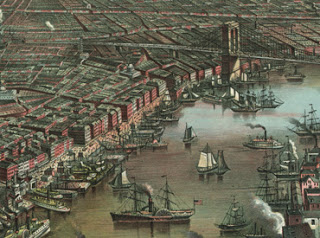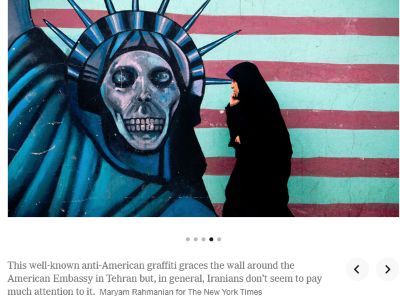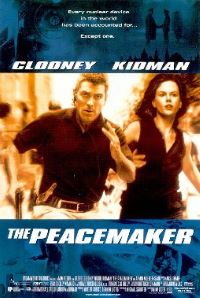
On April 5, while doing research, I took a lunch-break and picked up a copy of the Columbia Daily Spectator, the Columbia University undergraduate newspaper. In reading the paper, I came across several articles directly related to history and the current culture wars. Since I have a sample of only one newspaper, I can’t determine if the contents were typical of the campus news coverage, if it was just a chance day, or some combination of both. In any event, my lunch time reading turned into a fascinating glimpse into the front-lines of the culture war.
Martin Luther King
The first article to catch my attention was the front page one entitled “When Professors Make Insensitive Comments, Who Speaks up?” The article recounted the experience of one of two nonwhite students in an American studies seminar last year (apparently the junior year of the student who spoke up). In that seminar the professor informed the class that when studying the 1960s, it was acceptable to use the word “Negroes” to refer to African Americans since that was the term even black people used then to refer themselves.
The student took offense to this usage and communicated it to the professor via email with associated links why the usage was offensive. There was no change in speaking by the professor according to the student and the student subsequently ceased paying attention in class. When contacted by the newspaper, the professor responded:
It is in fact true, as a matter of historical record, that African Americans in the ‘50s and ‘60s wanted to be called ‘Negroes.’ Denying that practice would be a falsification of history.
So what? Aren’t we all entitled to our own facts? By referring to the historical record, the professor was privileging honkey Eurocentric values at the expense of the right for people to be feel good about themselves based on their politically-correct hyphen. The professor’s inability to recognize that the “historical record” is a subjective experience with no validity save in the mind of the beholder invalidates the professor’s legitimacy as a teacher. TRUTH IS SELF ESTEEEM, not the “historical record.”
Back in the real world, notice how the newspaper slanted its coverage. The title presupposes that the professor did in fact make an insensitive comment. The professor has been accused, tried, and convicted in the article title even before the facts of the case were presented. Imagine instead a different headline: “Twinkie Wilts When Faced with the Real World.” Same facts or “historical record,” but a different interpretation.
This issue is exact one I addressed in my recent post Fifty Years an African American: Perhaps It’s Time for a Change. Given what has happened in the last 50 years, what exactly is so great about the African American era compared to the Negro Era in the previous 50 years? Are we now at a point where the speeches of Martin Luther King need to be censored because of his relentless use of word the politically correct deem offensive? Are the achievements of Josh Gibson and Satchell Paige now to be confined to the dustbin of history because it is inappropriate to talk about the Negro Baseball League? Are the now-showcased triumphs in Hidden Figures of the female Negro computers (as people who computed were called in the days before IBM) at NASA now to be hidden once again? One boggles at how worked up a person can get at that mere utterance of a word that for centuries was a perfectly legitimate with no inherent negative connotations. One shudders to think at how Columbia is preparing such a person for the real world or is it that everyone will be entitled to their own facts from the President on down?
Suffragettes
So now that Columbia has removed Martin Luther King from the bus and thrown him under it, let’s see who else experienced the wrath of the politically correct in the culture wars. Why it is the suffragettes of Seneca Falls fame in an article entitled “Let’s Leave Seneca Falls.” This student did not ignore the historical record. In fact, contrary to the previous student, this student researched the past to make the case [to be fair the previous student did identify links to website supporting the view that Negro is an offensive term today].
The situation was the Contemporary Civilization class. At a certain point in the semester, the students “encountered our first female authors” when studying the Enlightenment authors of the 18th and 19th centuries. As part of the class, the students read the “Seneca Falls Declaration, partially written by Elizabeth Cady Stanton.” The student had prior knowledge “on the problematic relationship between abolitionism and first wave feminism.” Based on that knowledge of the historical record that was irrelevant to the previous student, this student “knew something was lacking from the historical framing of our discussion.”
Did this student then email the professor to express being offended by this lack? No. Instead, “during our classroom break I took it upon myself to find a quote of Stanton’s criticizing the American government’s decision to give newly freed black men the right to vote.” And as scholars of this topic know, finding such a passage wasn’t difficult. 19th century feminism tended to be a white women movement with white women agendas despite contacts with Frederick Douglass [who our current President thought was a living person as he is not familiar with the historical record]. The student decided that the way to deal with the historical record presented in the class that didn’t provide the full picture was to include the Sojourner Truth in the curriculum. Without knowing the exact mission or definition of the class, I can’t comment on whether including Sojourner Truth in the curriculum is legitimate or not but certainly on face value, it seems reasonable.
But consider the larger issues being raised here and around the country. Are people to be judged based on the times in which they lived or based on the values of the present called presentism (see The American Revolution and Presentism: The Triumph of Mel Gibson) For example what did Elizabeth Cady Stanton and Martin Luther King think of abortion? Legalization of drugs? Gun control? Homosexuality? Transgender? Did they support actions to end global warming? Do these people belong on pedestals if they are found wanting based on politically-correct values today? Does anyone? Confederate statues are like the proverbial canary in the coal mine. Sooner or later every historical figure will be called to task because no one of them will be worthy based on current standards. Some times when I watch do-gooder history shows, you would think the relationships among black and white, male and female, in the past actually were 21st century versions of nirvana. I confess I was always amazed at how white women suddenly awakened in the jungle or the desert always had perfect makeup with every hair in place. Now people of the past are being shown as if they are perfect versions of the progressive people today or else they are condemned as the villains. At the rate we are going, soon no one’s statue will be beyond approach and all of them will have to be relegated to museums.
Voice of Sanity
A third article in the issue of the Columbia Daily Spectator praised the Core Curriculum. This student described “the immense pleasure” in reading the works of a 19th-century white male writer, John Stuart Mill. The student described some of the values advocated by Mill that seemed far ahead of its time. The student took issue with a previous column in the Columbia Daily Spectator by a student who called the Columbia Core a veiled attempt at “indoctrination into white supremacy.” That student had castigated another student who previously had written a column in support of the Columbia Core as someone who had been indoctrinated into “Western cultural hegemony.” Support for the Core was tantamount to expressing the fear that “white supremacist holdover culture will erode over time.”
The author of the current column felt “obligated to push back” on these claims against the Columbia Core. For this author to understand how the modern world differs from the ancient world, one needs to study Western intellectual history. The specific example given was slavery, a global phenomenon for the past 10,000 years. Yet in the past 200 years it has been eradicated [note – not quite but the literary point is valid]. The student asked how such a change had happened. The answer was found in the Enlightenment challenge to slavery and the student noted that in most languages a word for “freedom” did not even exist. So as it turns out, the “oldest surviving critiques of Western civilization come from the Western canon itself.”
This example of critical thinking skills seems consistent with the traditional ideal of what should happen at college. Undoubtedly the Contemporary Civilization and Literature Humanities course is intended to foster precisely such a development. In fact this student when on to note that Martin Luther King in describing his own education commented that he read many of the same books as in the Columbia class. The student then asked, “Was he also ‘indoctrinated into white supremacy?’” The answer based on the first student would be “Yes, he was” since he used the word “Negro.” That is the reality of the situation today. Wouldn’t it be ironic if it is not Confederates who lead the charge to eliminate the January holiday to King but the politically correct?
As I said at the onset of this blog, my sample consisted of one issue of the undergraduate paper. These three articles do not mean that campus is divided in the thirds of John Adams. It does raise an issue about truth in packaging. Perhaps we need a new method of ranking colleges. Alongside the traditional scoring, there would be an additional one at the school, department, or class level for whether the college is politically correct or not. After all, shouldn’t applicants to a college know if the college has a religious affiliation? Shouldn’t the same considerations apply in the culture wars?
P.S. There was another article in the same issue about Black Panther but that will have to be deferred to another post.






